Analysis of Labor Relations Case Studies: Insights and Solutions
VerifiedAdded on 2023/05/31
|7
|1783
|463
Case Study
AI Summary
This assignment presents an analysis of two case studies related to labor relations. The first case study, 8-1, examines the conditions under which a company can legally discipline or discharge employees for comments made about the company, including those made on social media platforms like Facebook. It also explores the implications of union representation and the role of the National Labor Relations Board. The second case study, 9-4, focuses on an economic strike initiated by truck drivers demanding higher pay and medical insurance. The analysis considers the legality of the strike, the rights of the company to hire replacement workers, and the extent of reinstatement rights for striking employees. The assignment provides insights into unfair labor practices, employment law, and effective management strategies in labor disputes, referencing various academic sources to support its arguments.
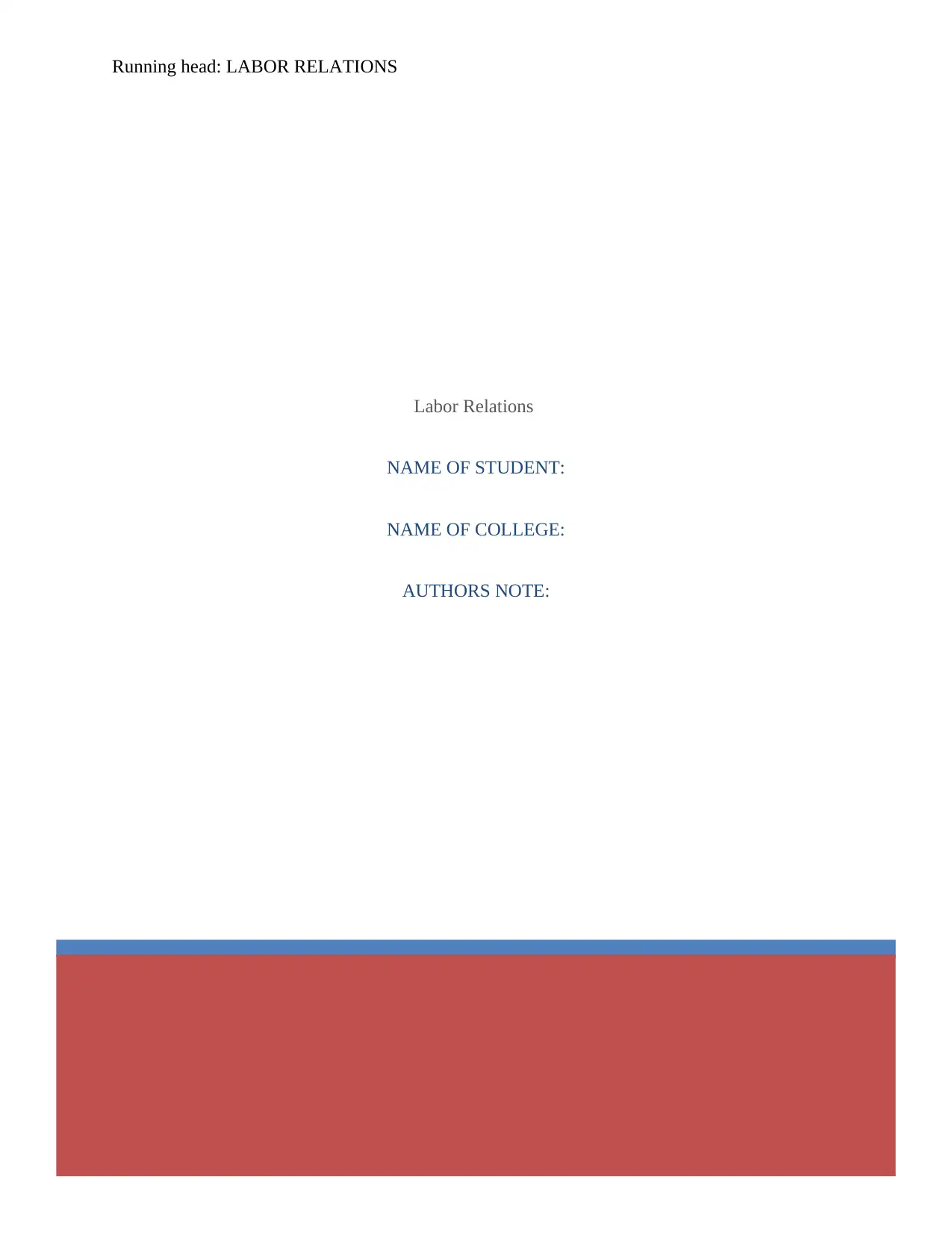
Labor Relations
NAME OF STUDENT:
NAME OF COLLEGE:
AUTHORS NOTE:
Running head: LABOR RELATIONS
NAME OF STUDENT:
NAME OF COLLEGE:
AUTHORS NOTE:
Running head: LABOR RELATIONS
Paraphrase This Document
Need a fresh take? Get an instant paraphrase of this document with our AI Paraphraser
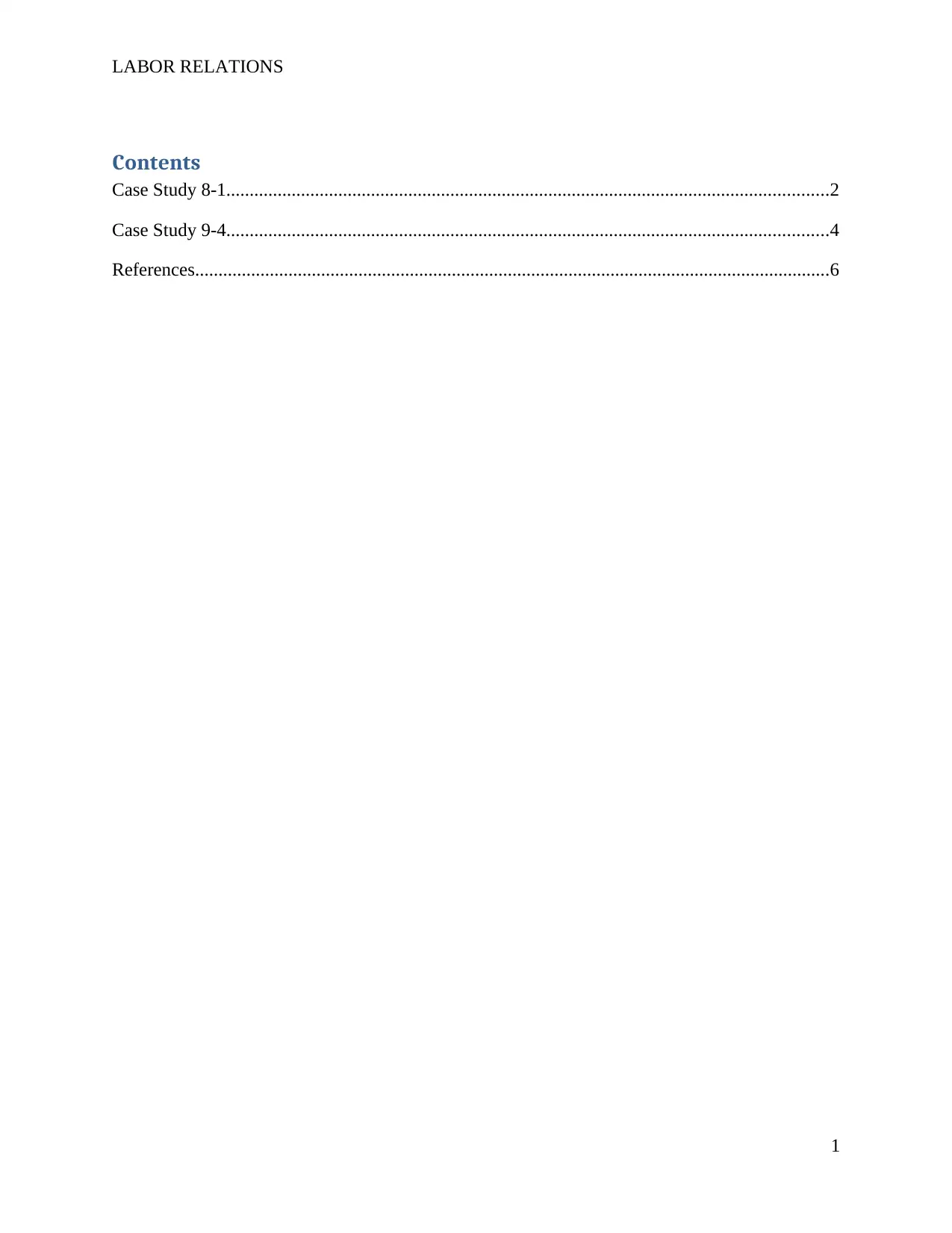
LABOR RELATIONS
Contents
Case Study 8-1.................................................................................................................................2
Case Study 9-4.................................................................................................................................4
References........................................................................................................................................6
1
Contents
Case Study 8-1.................................................................................................................................2
Case Study 9-4.................................................................................................................................4
References........................................................................................................................................6
1
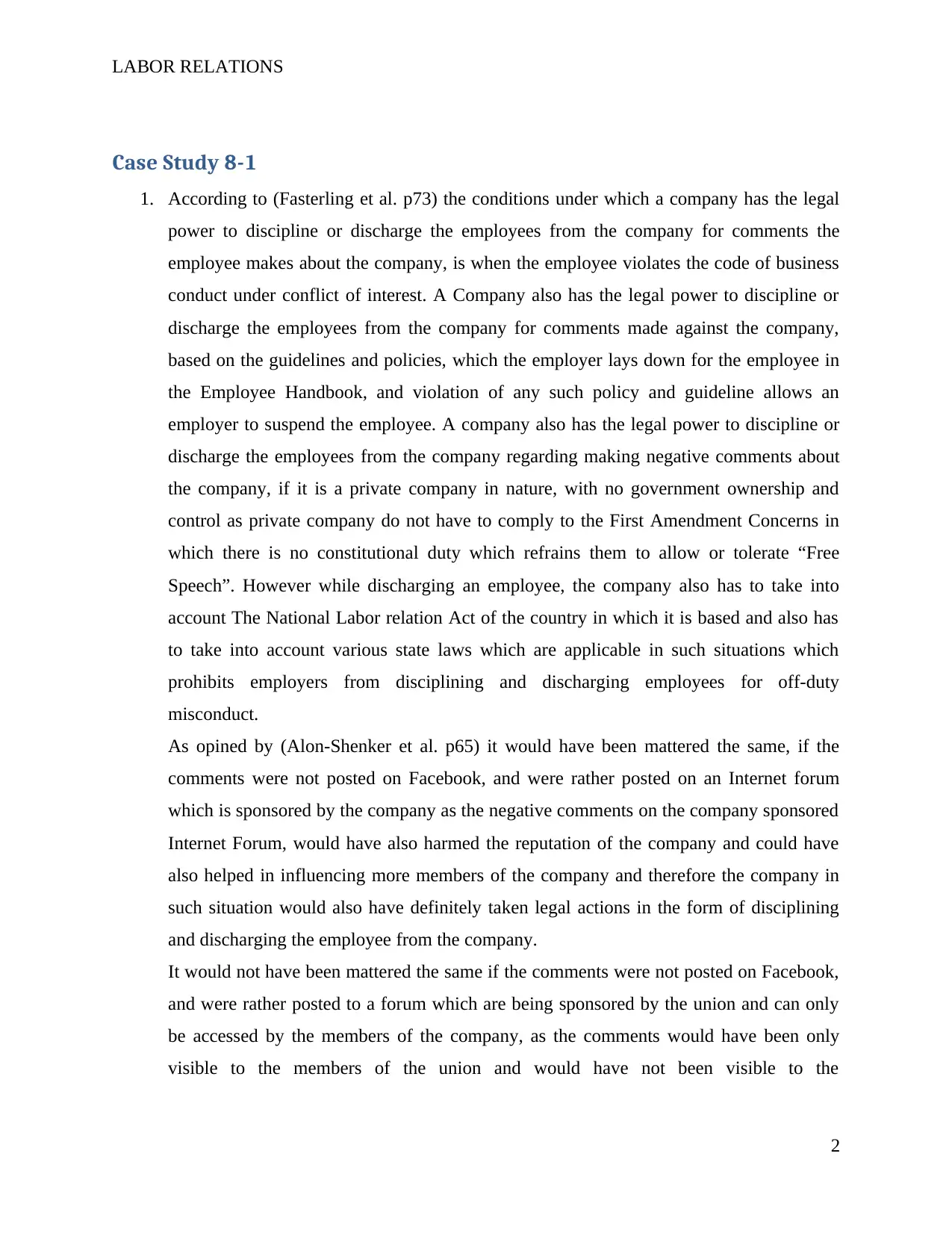
LABOR RELATIONS
Case Study 8-1
1. According to (Fasterling et al. p73) the conditions under which a company has the legal
power to discipline or discharge the employees from the company for comments the
employee makes about the company, is when the employee violates the code of business
conduct under conflict of interest. A Company also has the legal power to discipline or
discharge the employees from the company for comments made against the company,
based on the guidelines and policies, which the employer lays down for the employee in
the Employee Handbook, and violation of any such policy and guideline allows an
employer to suspend the employee. A company also has the legal power to discipline or
discharge the employees from the company regarding making negative comments about
the company, if it is a private company in nature, with no government ownership and
control as private company do not have to comply to the First Amendment Concerns in
which there is no constitutional duty which refrains them to allow or tolerate “Free
Speech”. However while discharging an employee, the company also has to take into
account The National Labor relation Act of the country in which it is based and also has
to take into account various state laws which are applicable in such situations which
prohibits employers from disciplining and discharging employees for off-duty
misconduct.
As opined by (Alon-Shenker et al. p65) it would have been mattered the same, if the
comments were not posted on Facebook, and were rather posted on an Internet forum
which is sponsored by the company as the negative comments on the company sponsored
Internet Forum, would have also harmed the reputation of the company and could have
also helped in influencing more members of the company and therefore the company in
such situation would also have definitely taken legal actions in the form of disciplining
and discharging the employee from the company.
It would not have been mattered the same if the comments were not posted on Facebook,
and were rather posted to a forum which are being sponsored by the union and can only
be accessed by the members of the company, as the comments would have been only
visible to the members of the union and would have not been visible to the
2
Case Study 8-1
1. According to (Fasterling et al. p73) the conditions under which a company has the legal
power to discipline or discharge the employees from the company for comments the
employee makes about the company, is when the employee violates the code of business
conduct under conflict of interest. A Company also has the legal power to discipline or
discharge the employees from the company for comments made against the company,
based on the guidelines and policies, which the employer lays down for the employee in
the Employee Handbook, and violation of any such policy and guideline allows an
employer to suspend the employee. A company also has the legal power to discipline or
discharge the employees from the company regarding making negative comments about
the company, if it is a private company in nature, with no government ownership and
control as private company do not have to comply to the First Amendment Concerns in
which there is no constitutional duty which refrains them to allow or tolerate “Free
Speech”. However while discharging an employee, the company also has to take into
account The National Labor relation Act of the country in which it is based and also has
to take into account various state laws which are applicable in such situations which
prohibits employers from disciplining and discharging employees for off-duty
misconduct.
As opined by (Alon-Shenker et al. p65) it would have been mattered the same, if the
comments were not posted on Facebook, and were rather posted on an Internet forum
which is sponsored by the company as the negative comments on the company sponsored
Internet Forum, would have also harmed the reputation of the company and could have
also helped in influencing more members of the company and therefore the company in
such situation would also have definitely taken legal actions in the form of disciplining
and discharging the employee from the company.
It would not have been mattered the same if the comments were not posted on Facebook,
and were rather posted to a forum which are being sponsored by the union and can only
be accessed by the members of the company, as the comments would have been only
visible to the members of the union and would have not been visible to the
2
⊘ This is a preview!⊘
Do you want full access?
Subscribe today to unlock all pages.

Trusted by 1+ million students worldwide
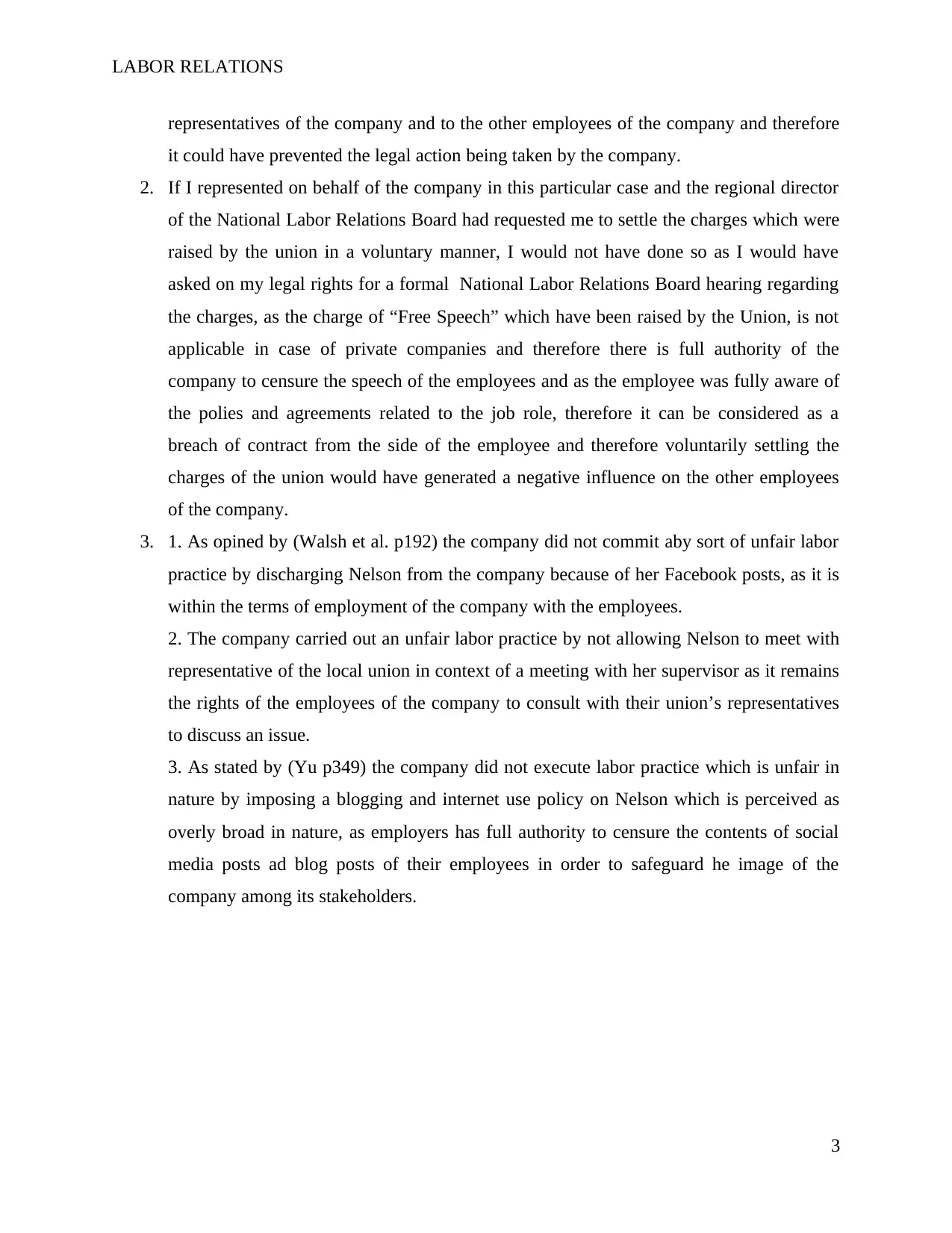
LABOR RELATIONS
representatives of the company and to the other employees of the company and therefore
it could have prevented the legal action being taken by the company.
2. If I represented on behalf of the company in this particular case and the regional director
of the National Labor Relations Board had requested me to settle the charges which were
raised by the union in a voluntary manner, I would not have done so as I would have
asked on my legal rights for a formal National Labor Relations Board hearing regarding
the charges, as the charge of “Free Speech” which have been raised by the Union, is not
applicable in case of private companies and therefore there is full authority of the
company to censure the speech of the employees and as the employee was fully aware of
the polies and agreements related to the job role, therefore it can be considered as a
breach of contract from the side of the employee and therefore voluntarily settling the
charges of the union would have generated a negative influence on the other employees
of the company.
3. 1. As opined by (Walsh et al. p192) the company did not commit aby sort of unfair labor
practice by discharging Nelson from the company because of her Facebook posts, as it is
within the terms of employment of the company with the employees.
2. The company carried out an unfair labor practice by not allowing Nelson to meet with
representative of the local union in context of a meeting with her supervisor as it remains
the rights of the employees of the company to consult with their union’s representatives
to discuss an issue.
3. As stated by (Yu p349) the company did not execute labor practice which is unfair in
nature by imposing a blogging and internet use policy on Nelson which is perceived as
overly broad in nature, as employers has full authority to censure the contents of social
media posts ad blog posts of their employees in order to safeguard he image of the
company among its stakeholders.
3
representatives of the company and to the other employees of the company and therefore
it could have prevented the legal action being taken by the company.
2. If I represented on behalf of the company in this particular case and the regional director
of the National Labor Relations Board had requested me to settle the charges which were
raised by the union in a voluntary manner, I would not have done so as I would have
asked on my legal rights for a formal National Labor Relations Board hearing regarding
the charges, as the charge of “Free Speech” which have been raised by the Union, is not
applicable in case of private companies and therefore there is full authority of the
company to censure the speech of the employees and as the employee was fully aware of
the polies and agreements related to the job role, therefore it can be considered as a
breach of contract from the side of the employee and therefore voluntarily settling the
charges of the union would have generated a negative influence on the other employees
of the company.
3. 1. As opined by (Walsh et al. p192) the company did not commit aby sort of unfair labor
practice by discharging Nelson from the company because of her Facebook posts, as it is
within the terms of employment of the company with the employees.
2. The company carried out an unfair labor practice by not allowing Nelson to meet with
representative of the local union in context of a meeting with her supervisor as it remains
the rights of the employees of the company to consult with their union’s representatives
to discuss an issue.
3. As stated by (Yu p349) the company did not execute labor practice which is unfair in
nature by imposing a blogging and internet use policy on Nelson which is perceived as
overly broad in nature, as employers has full authority to censure the contents of social
media posts ad blog posts of their employees in order to safeguard he image of the
company among its stakeholders.
3
Paraphrase This Document
Need a fresh take? Get an instant paraphrase of this document with our AI Paraphraser
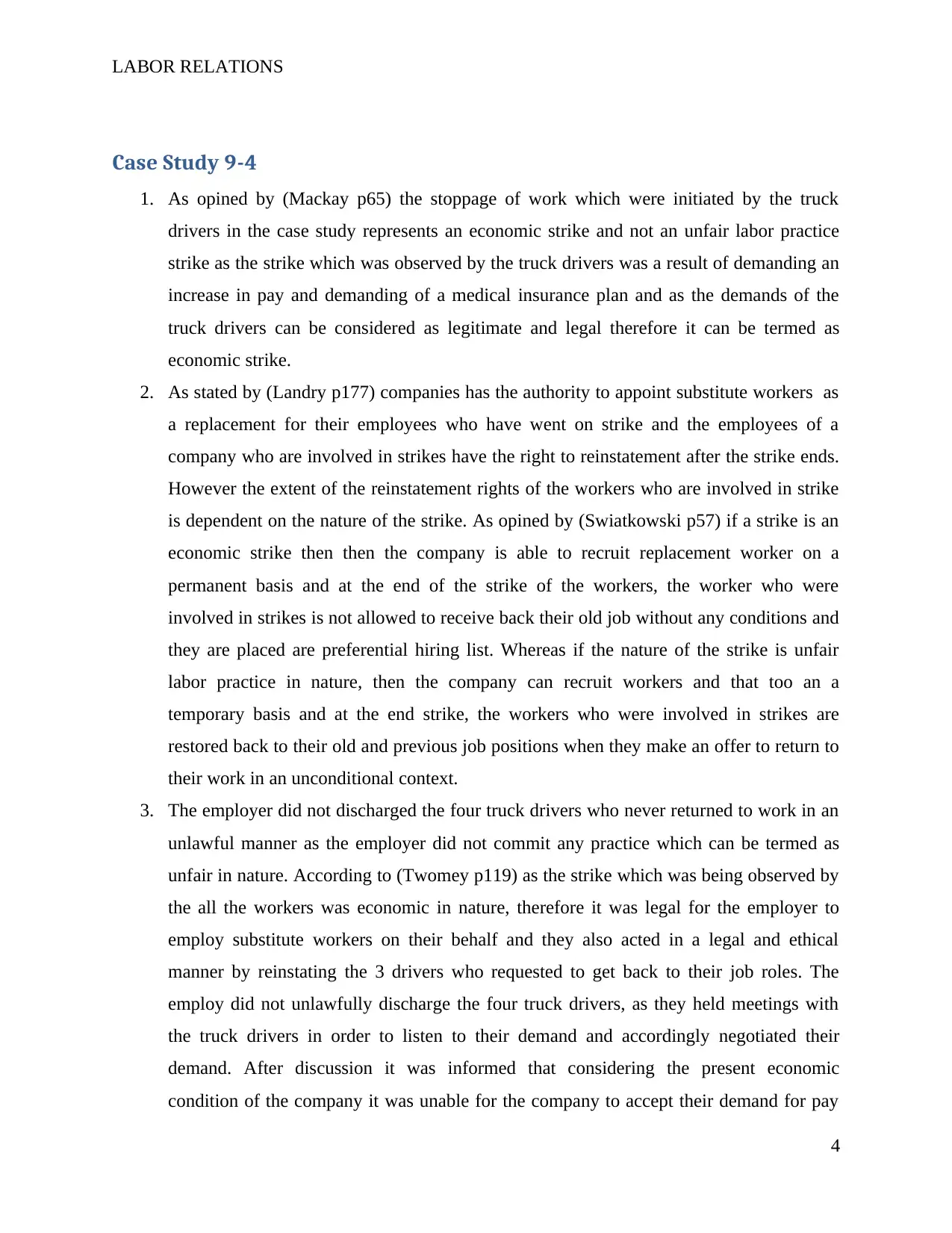
LABOR RELATIONS
Case Study 9-4
1. As opined by (Mackay p65) the stoppage of work which were initiated by the truck
drivers in the case study represents an economic strike and not an unfair labor practice
strike as the strike which was observed by the truck drivers was a result of demanding an
increase in pay and demanding of a medical insurance plan and as the demands of the
truck drivers can be considered as legitimate and legal therefore it can be termed as
economic strike.
2. As stated by (Landry p177) companies has the authority to appoint substitute workers as
a replacement for their employees who have went on strike and the employees of a
company who are involved in strikes have the right to reinstatement after the strike ends.
However the extent of the reinstatement rights of the workers who are involved in strike
is dependent on the nature of the strike. As opined by (Swiatkowski p57) if a strike is an
economic strike then then the company is able to recruit replacement worker on a
permanent basis and at the end of the strike of the workers, the worker who were
involved in strikes is not allowed to receive back their old job without any conditions and
they are placed are preferential hiring list. Whereas if the nature of the strike is unfair
labor practice in nature, then the company can recruit workers and that too an a
temporary basis and at the end strike, the workers who were involved in strikes are
restored back to their old and previous job positions when they make an offer to return to
their work in an unconditional context.
3. The employer did not discharged the four truck drivers who never returned to work in an
unlawful manner as the employer did not commit any practice which can be termed as
unfair in nature. According to (Twomey p119) as the strike which was being observed by
the all the workers was economic in nature, therefore it was legal for the employer to
employ substitute workers on their behalf and they also acted in a legal and ethical
manner by reinstating the 3 drivers who requested to get back to their job roles. The
employ did not unlawfully discharge the four truck drivers, as they held meetings with
the truck drivers in order to listen to their demand and accordingly negotiated their
demand. After discussion it was informed that considering the present economic
condition of the company it was unable for the company to accept their demand for pay
4
Case Study 9-4
1. As opined by (Mackay p65) the stoppage of work which were initiated by the truck
drivers in the case study represents an economic strike and not an unfair labor practice
strike as the strike which was observed by the truck drivers was a result of demanding an
increase in pay and demanding of a medical insurance plan and as the demands of the
truck drivers can be considered as legitimate and legal therefore it can be termed as
economic strike.
2. As stated by (Landry p177) companies has the authority to appoint substitute workers as
a replacement for their employees who have went on strike and the employees of a
company who are involved in strikes have the right to reinstatement after the strike ends.
However the extent of the reinstatement rights of the workers who are involved in strike
is dependent on the nature of the strike. As opined by (Swiatkowski p57) if a strike is an
economic strike then then the company is able to recruit replacement worker on a
permanent basis and at the end of the strike of the workers, the worker who were
involved in strikes is not allowed to receive back their old job without any conditions and
they are placed are preferential hiring list. Whereas if the nature of the strike is unfair
labor practice in nature, then the company can recruit workers and that too an a
temporary basis and at the end strike, the workers who were involved in strikes are
restored back to their old and previous job positions when they make an offer to return to
their work in an unconditional context.
3. The employer did not discharged the four truck drivers who never returned to work in an
unlawful manner as the employer did not commit any practice which can be termed as
unfair in nature. According to (Twomey p119) as the strike which was being observed by
the all the workers was economic in nature, therefore it was legal for the employer to
employ substitute workers on their behalf and they also acted in a legal and ethical
manner by reinstating the 3 drivers who requested to get back to their job roles. The
employ did not unlawfully discharge the four truck drivers, as they held meetings with
the truck drivers in order to listen to their demand and accordingly negotiated their
demand. After discussion it was informed that considering the present economic
condition of the company it was unable for the company to accept their demand for pay
4
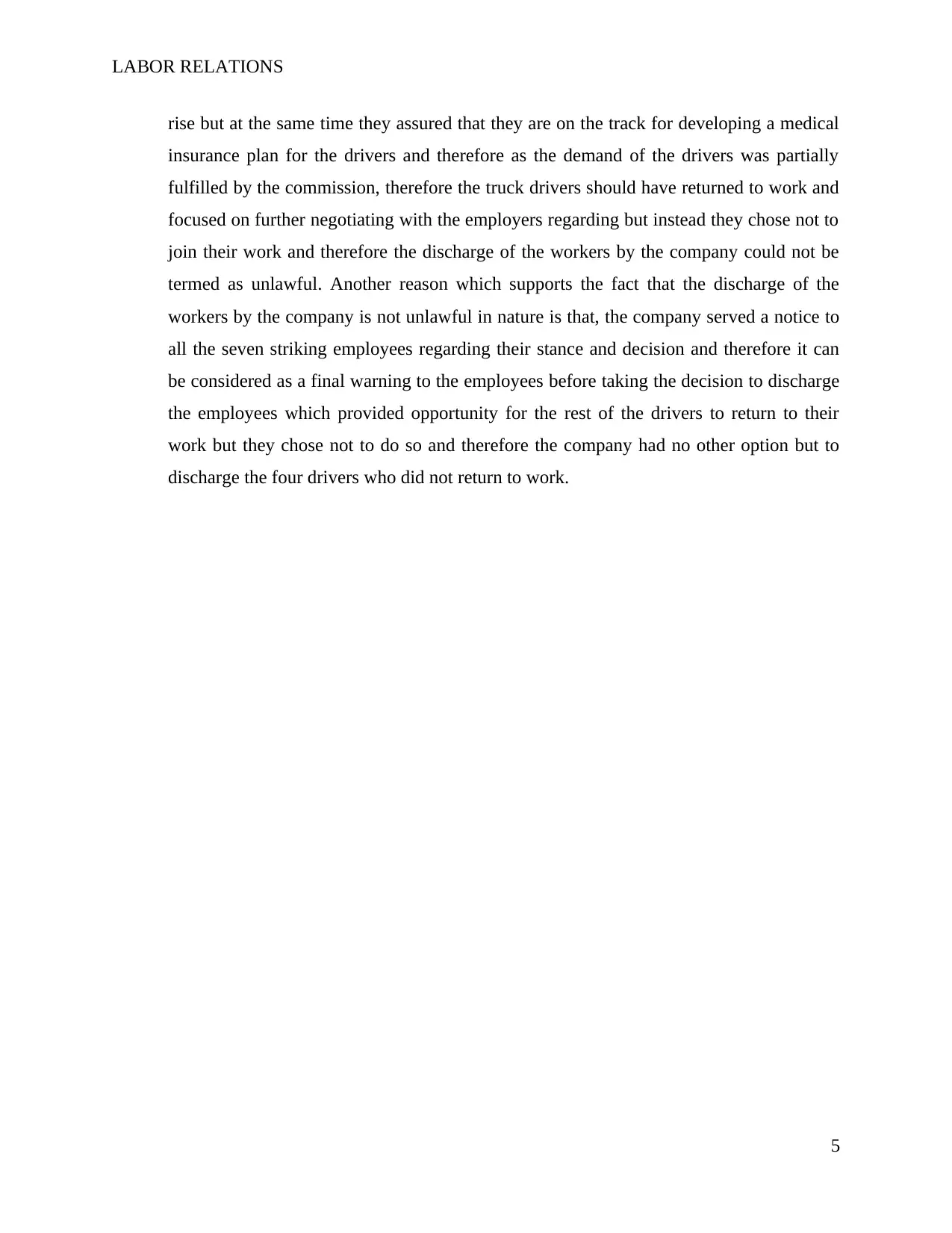
LABOR RELATIONS
rise but at the same time they assured that they are on the track for developing a medical
insurance plan for the drivers and therefore as the demand of the drivers was partially
fulfilled by the commission, therefore the truck drivers should have returned to work and
focused on further negotiating with the employers regarding but instead they chose not to
join their work and therefore the discharge of the workers by the company could not be
termed as unlawful. Another reason which supports the fact that the discharge of the
workers by the company is not unlawful in nature is that, the company served a notice to
all the seven striking employees regarding their stance and decision and therefore it can
be considered as a final warning to the employees before taking the decision to discharge
the employees which provided opportunity for the rest of the drivers to return to their
work but they chose not to do so and therefore the company had no other option but to
discharge the four drivers who did not return to work.
5
rise but at the same time they assured that they are on the track for developing a medical
insurance plan for the drivers and therefore as the demand of the drivers was partially
fulfilled by the commission, therefore the truck drivers should have returned to work and
focused on further negotiating with the employers regarding but instead they chose not to
join their work and therefore the discharge of the workers by the company could not be
termed as unlawful. Another reason which supports the fact that the discharge of the
workers by the company is not unlawful in nature is that, the company served a notice to
all the seven striking employees regarding their stance and decision and therefore it can
be considered as a final warning to the employees before taking the decision to discharge
the employees which provided opportunity for the rest of the drivers to return to their
work but they chose not to do so and therefore the company had no other option but to
discharge the four drivers who did not return to work.
5
⊘ This is a preview!⊘
Do you want full access?
Subscribe today to unlock all pages.

Trusted by 1+ million students worldwide
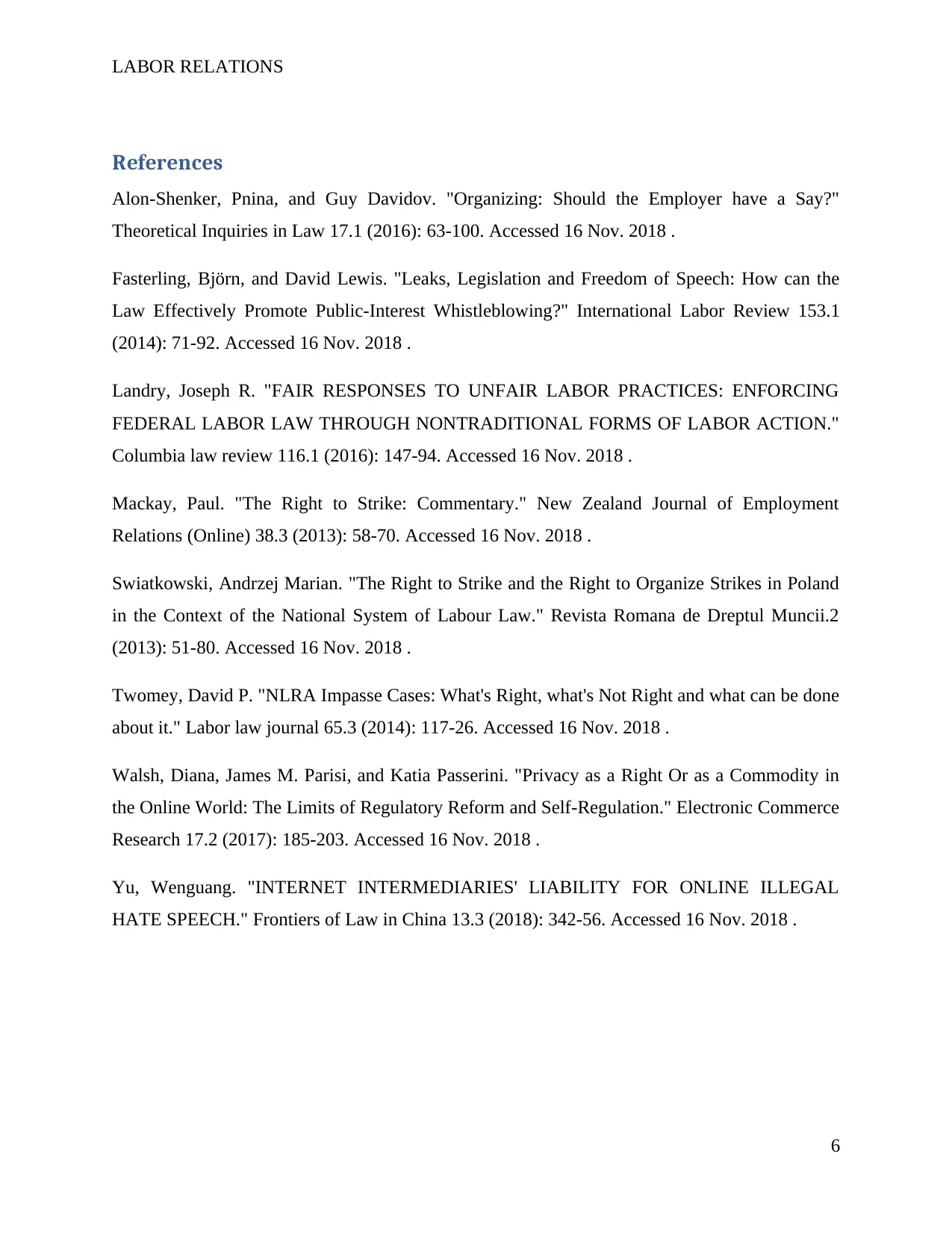
LABOR RELATIONS
References
Alon-Shenker, Pnina, and Guy Davidov. "Organizing: Should the Employer have a Say?"
Theoretical Inquiries in Law 17.1 (2016): 63-100. Accessed 16 Nov. 2018 .
Fasterling, Björn, and David Lewis. "Leaks, Legislation and Freedom of Speech: How can the
Law Effectively Promote Public-Interest Whistleblowing?" International Labor Review 153.1
(2014): 71-92. Accessed 16 Nov. 2018 .
Landry, Joseph R. "FAIR RESPONSES TO UNFAIR LABOR PRACTICES: ENFORCING
FEDERAL LABOR LAW THROUGH NONTRADITIONAL FORMS OF LABOR ACTION."
Columbia law review 116.1 (2016): 147-94. Accessed 16 Nov. 2018 .
Mackay, Paul. "The Right to Strike: Commentary." New Zealand Journal of Employment
Relations (Online) 38.3 (2013): 58-70. Accessed 16 Nov. 2018 .
Swiatkowski, Andrzej Marian. "The Right to Strike and the Right to Organize Strikes in Poland
in the Context of the National System of Labour Law." Revista Romana de Dreptul Muncii.2
(2013): 51-80. Accessed 16 Nov. 2018 .
Twomey, David P. "NLRA Impasse Cases: What's Right, what's Not Right and what can be done
about it." Labor law journal 65.3 (2014): 117-26. Accessed 16 Nov. 2018 .
Walsh, Diana, James M. Parisi, and Katia Passerini. "Privacy as a Right Or as a Commodity in
the Online World: The Limits of Regulatory Reform and Self-Regulation." Electronic Commerce
Research 17.2 (2017): 185-203. Accessed 16 Nov. 2018 .
Yu, Wenguang. "INTERNET INTERMEDIARIES' LIABILITY FOR ONLINE ILLEGAL
HATE SPEECH." Frontiers of Law in China 13.3 (2018): 342-56. Accessed 16 Nov. 2018 .
6
References
Alon-Shenker, Pnina, and Guy Davidov. "Organizing: Should the Employer have a Say?"
Theoretical Inquiries in Law 17.1 (2016): 63-100. Accessed 16 Nov. 2018 .
Fasterling, Björn, and David Lewis. "Leaks, Legislation and Freedom of Speech: How can the
Law Effectively Promote Public-Interest Whistleblowing?" International Labor Review 153.1
(2014): 71-92. Accessed 16 Nov. 2018 .
Landry, Joseph R. "FAIR RESPONSES TO UNFAIR LABOR PRACTICES: ENFORCING
FEDERAL LABOR LAW THROUGH NONTRADITIONAL FORMS OF LABOR ACTION."
Columbia law review 116.1 (2016): 147-94. Accessed 16 Nov. 2018 .
Mackay, Paul. "The Right to Strike: Commentary." New Zealand Journal of Employment
Relations (Online) 38.3 (2013): 58-70. Accessed 16 Nov. 2018 .
Swiatkowski, Andrzej Marian. "The Right to Strike and the Right to Organize Strikes in Poland
in the Context of the National System of Labour Law." Revista Romana de Dreptul Muncii.2
(2013): 51-80. Accessed 16 Nov. 2018 .
Twomey, David P. "NLRA Impasse Cases: What's Right, what's Not Right and what can be done
about it." Labor law journal 65.3 (2014): 117-26. Accessed 16 Nov. 2018 .
Walsh, Diana, James M. Parisi, and Katia Passerini. "Privacy as a Right Or as a Commodity in
the Online World: The Limits of Regulatory Reform and Self-Regulation." Electronic Commerce
Research 17.2 (2017): 185-203. Accessed 16 Nov. 2018 .
Yu, Wenguang. "INTERNET INTERMEDIARIES' LIABILITY FOR ONLINE ILLEGAL
HATE SPEECH." Frontiers of Law in China 13.3 (2018): 342-56. Accessed 16 Nov. 2018 .
6
1 out of 7
Related Documents
Your All-in-One AI-Powered Toolkit for Academic Success.
+13062052269
info@desklib.com
Available 24*7 on WhatsApp / Email
![[object Object]](/_next/static/media/star-bottom.7253800d.svg)
Unlock your academic potential
Copyright © 2020–2025 A2Z Services. All Rights Reserved. Developed and managed by ZUCOL.





